Black woman replacing Alabama editor who endorsed KKK
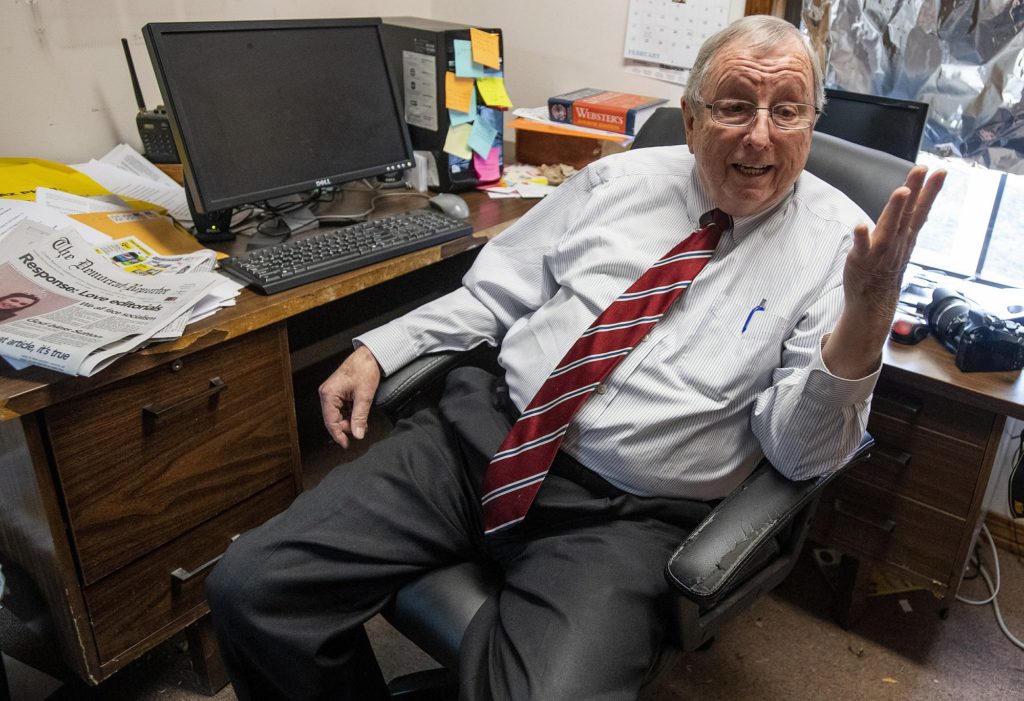
A white Alabama newspaper editor who advocated for the revival of the Ku Klux Klan is turning over control of the small weekly to a black woman. The Democrat-Reporter of Linden, Alabama, announced Friday that Elecia R. Dexter will take over as publisher and editor from Goodloe Sutton, who has run the 140-year-old paper since the 1960s. Dexter, 46, told The Associated Press that Sutton will retain ownership of the newspaper, which has a circulation of about 3,000, “but I will handle everything else.” Sutton had a history of publishing racially and ethnically insensitive editorials, and Dexter said she hoped her appointment would let the community know “this is everybody’s paper.” “I think it can be helpful,” she said. The change came the week after Sutton wrote and published an editorial that began: “Time for the Ku Klux Klan to night ride again.” The editorial said Democrats and “Democrats in the Republican Party” are plotting to raise taxes, so the Klan should raid their communities. Sutton, in a subsequent interview with the Montgomery Advertiser, suggested lynchings as a way to clean up Washington. Sutton also questioned whether the KKK was violent, claiming America’s most feared white supremacist terrorist organization “didn’t kill but a few people.” Auburn University and the University of Southern Mississippi quickly rescinded previous honors for Sutton, who won praise two decades ago for stories exposing corruption in the sheriff’s office. The Alabama Press Association censured Sutton and suspended the Democrat-Reporter’s membership. Dexter, whose family is from rural Marengo County, where Linden is located near the Mississippi line, said she began working at the paper earlier this year and has a good working relationship with Goodloe. She added: “I told him there were some different ways you could have made your point.” The paper has received emails from those who supported what Sutton wrote and others who were “disgusted” by his statements, she said. The paper dates to 1879 and its editorials are consistently conservative and often critical of Democrats. The use of “Democrat” in its name reflects back to the period when nearly all white conservatives in the South were Democrats. Republished with permission from the Associated Press.
Alabama newspaper editor calls for the Ku Klux Klan to ‘night ride again’
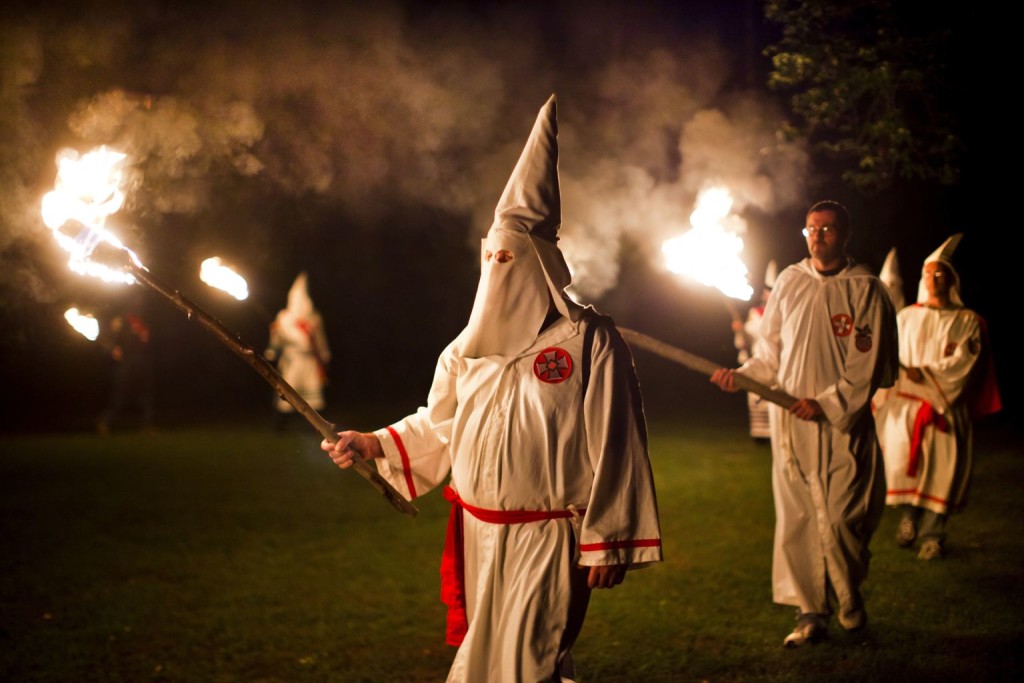
The editor of an Alabama newspaper has come under fire for penning an editorial calling for the mass lynchings of Washington Democrats by the Ku Klux Klan (KKK). Editor and Publisher of the Democrat-Reporter, Goodloe Sutton on Monday confirmed he wrote the editorial titled “Klan needs to ride again,” in a Feb. 14 print edition of the weekly newspaper that covers Marengo County. In the editorial, Sutton wrote, “Democrats in the Republican Party and Democrats are plotting to raise taxes in Alabama. They do not understand how to eliminate expenses when money is needed in other areas. This socialist-communist ideology sounds good to the ignorant, the uneducated, and the simple-minded people.” “If we could get the Klan to go up there and clean out D.C., we’d all been better off,” he told the Montgomery Advertiser. When asked to clarify what he meant about “cleaning up” D.C., Sutton said, “We’ll get the hemp ropes out, loop them over a tall limb and hang all of them.” Alabama’s D.C. Democrats react Sutton’s editorial has caught the attention of both Democrats in the Alabama delegation in Washington. U.S. Senator Doug Jones took to twitter to express his disgust and called on Sutton to resign from his post. “OMG! What rock did this guy crawl out from under? This editorial is absolutely disgusting & he should resign -NOW,” tweeted Jones. “I have seen what happens when we stand by while people-especially those with influence- publish racist, hateful views. Words matter. Actions matter. Resign now!” OMG! What rock did this guy crawl out from under? This editorial is absolutely disgusting & he should resign -NOW! I have seen what happens when we stand by while people-especially those with influence- publish racist, hateful views. Words matter. Actions matter. Resign now! https://t.co/V1V1vxDBKH — Doug Jones (@DougJones) February 19, 2019 7th District U.S. Rep. Terri Sewell did as well. “For the millions of people of color who have been terrorized by white supremacy, this kind of ‘editorializing’ about lynching is not a joke — it is a threat,” Sewell tweeted. “These comments are deeply offensive and inappropriate, especially in 2019.” For the millions of people of color who have been terrorized by white supremacy, this kind of “editorializing” about lynching is not a joke – it is a threat. These comments are deeply offensive and inappropriate, especially in 2019. Mr. Sutton should apologize and resign. https://t.co/AOYYGINEdh — Rep. Terri A. Sewell (@RepTerriSewell) February 19, 2019
Starbucks chairman questions country’s ‘moral fiber’
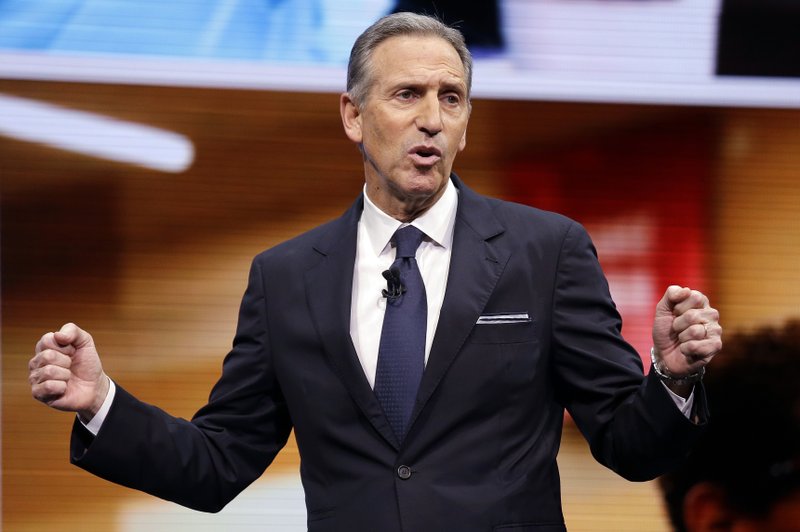
Starbucks chairman Howard Schultz says the events surrounding a white nationalist rally in Charlottesville, Virginia, last weekend have put the “moral fiber” of the country in question. Schultz said at an employee forum in Seattle on Tuesday that he has “profound concern about the lack of character, morality, humanity,” displayed at the rally, according to a recap of the meeting posted on Starbucks’ website. “The moral fiber, the values, and what we as a country have stood for is literally hanging in the abyss,” Schultz told employees. “We are at a critical juncture in American history. That is not an exaggeration. We are at and facing a crucible in which our daily life is being challenged and being questioned about what is right and what is wrong.” A throng of hundreds, mostly white men and many carrying guns, converged on the college town Saturday yelling anti-Semitic and racist slurs and carrying Confederate flags and neo-Nazi and KKK signs. A street fight broke out between them and counter-protesters, and a woman was killed and others injured when a man drove a car into people marching against the rally. After the violence, President Donald Trump was blasted for putting the blame on both sides and saying both sides included “very fine people.” Schultz was not a member of either of Trump’s two panels of business leaders that dissolved Wednesday after several CEOs stepped down in protest of Trump’s comments. And he told his employees Tuesday he’d let the actions and words of the president speak for themselves. “What we witnessed this past weekend … is against every sense of what is right,” he said. “My fear is not only that this behavior is being given permission and license, but its conduct is being normalized to the point where people are no longer hiding their face.” Telling employees he was speaking to them “as an American, as a Jew, as a parent, as a grandparent,” Schultz said it’s hard to remain optimistic about the country’s future “in the midst of such a storm,” but he still is. Starbucks and Schultz have been outspoken on social issues. Republish with permission of The Associated Press.
Southern anger: Nazis, KKK ‘hijacking’ Confederate debate
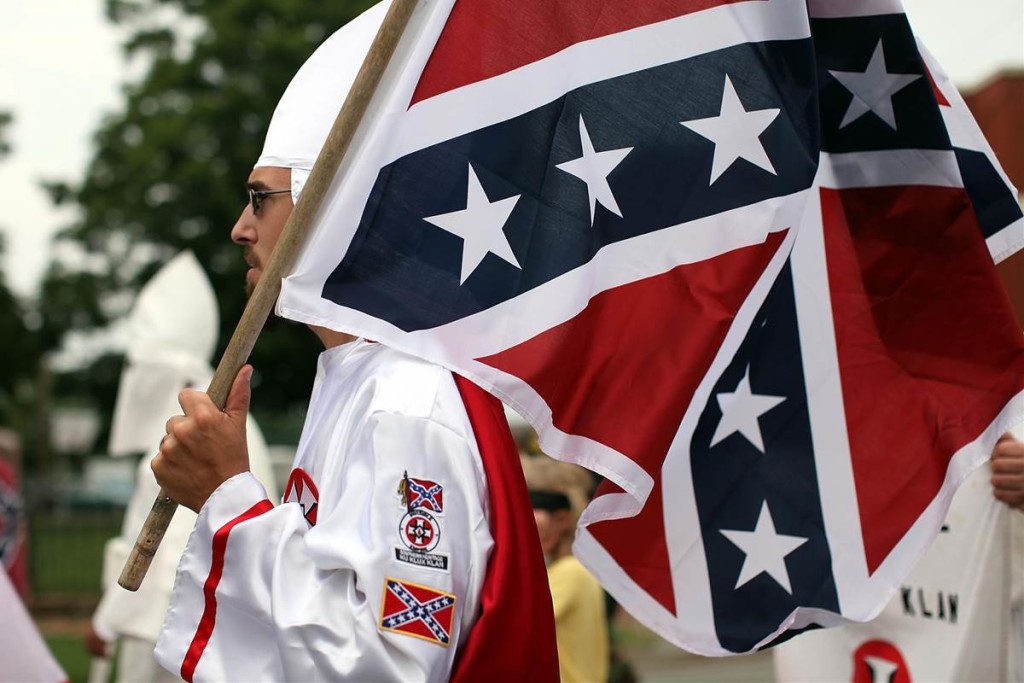
White Southerners who equate Old South symbols with regional pride rather than hate are even more on the defensive since neo-Nazis, Ku Klux Klansmen and other extremists became the face of the fight over Confederate monuments. With more than two dozen relatives who fought for the Confederacy, Robert Castello literally wears his Southern pride. The visor, suspenders and ring he donned Thursday were all emblazoned with the familiar design of the rebel battle flag. But Castello, whose Dixie General Store sells Confederate-themed hats, shirts, stickers and signs in rural eastern Alabama, said he doesn’t have any use for overtly racist groups like the Klan. “When I was growing up it was like a badge of honor to be proud of your Southern heritage. It was taught and it was part of who you were,” said Castello, 58. “To see it denigrated down to the point of Nazis is disgusting.” A leading Southern heritage organization, the Sons of Confederate Veterans, had no official involvement in the bloody protests in Charlottesville, Virginia, and its leader condemned the white supremacists who rallied for preserving a statute of Confederate Gen. Robert E. Lee. “It’s painful to watch, for lack of better words,” said Thomas V. Strain Jr., the group’s commander. “It was our family that fought, and it was our families that died, and now we have these knuckleheads hijacking the flag for their own purposes.” Social media feeds dominated by Southern whites contain similar criticism of extremist organizations, which watchdog groups have said were out in force in Charlottesville in the largest white supremacist gathering in years. The driver of the car, James Alex Fields Jr., 20, has been described as an admirer of Adolf Hitler and Nazi Germany. Photographed with white nationalist demonstrators before the deadly crash, Fields is charged with murder and other offenses. The Confederate battle flag has long been used as a symbol by the Ku Klux Klan, which has displayed the banner during rallies for decades. But many white Southerners see the flag and rebel monuments as nothing more than part of a regional identity that includes Lynyrd Skynyrd music, college football, sweet tea and the Bible. The idea that any of those things have become caught up with Nazism is baffling to people like Castello. “I’ve always loved Southern heritage, even when I was in high school,” he said. “It was passed down that it was an honorable thing and I believe it was, although not all of it was good.” Even the children of Southern music icon Johnny Cash are distancing themselves from extremists after a neo-Nazi was shown wearing a shirt with an image of the late singer in Charlottesville. A Facebook post by the Cash family requested that his name “be kept far away from destructive and hateful ideology.” Jeff Schoep, who leads a white nationalist group that demonstrated in Charlottesville, said Confederate symbols and monuments have become a rallying cause for white extremists not because of any Southern identity but because they see their removal as an “assault on American freedoms.” To be sure, neither Castello nor Strain advocates the removal of Confederate monuments. Both see them as important historical touchstones that have an important place in modern life. “These statues were erected over 100 year ago to honor the history of the United States,” said Strain. “They’re just as important to the entire history of the U.S. as the monuments erected to our forefathers.” Similarly, President Donald Trump on Thursday blasted the movement to remove Confederate monuments, tweeting that the nation is seeing “the history and culture of our great country being ripped apart.” Castello supports Trump and sees the president as the unlikely New York real estate magnate who has become a defender of Southern symbols. Trump seems to get that not all Southerners are Nazis or Klansmen, Castello said, and others should, too. “To me all the talk about the Klan and the Nazis is a smoke screen for an attack on Southern heritage,” he said. “They want to link everyone who flies the (Confederate) flag with the Klan and Nazis, which I don’t want any part of.” Republished with permission of The Associated Press.
Donald Trump says racism is ‘evil,’ condemns KKK and neo-Nazis as ‘thugs’
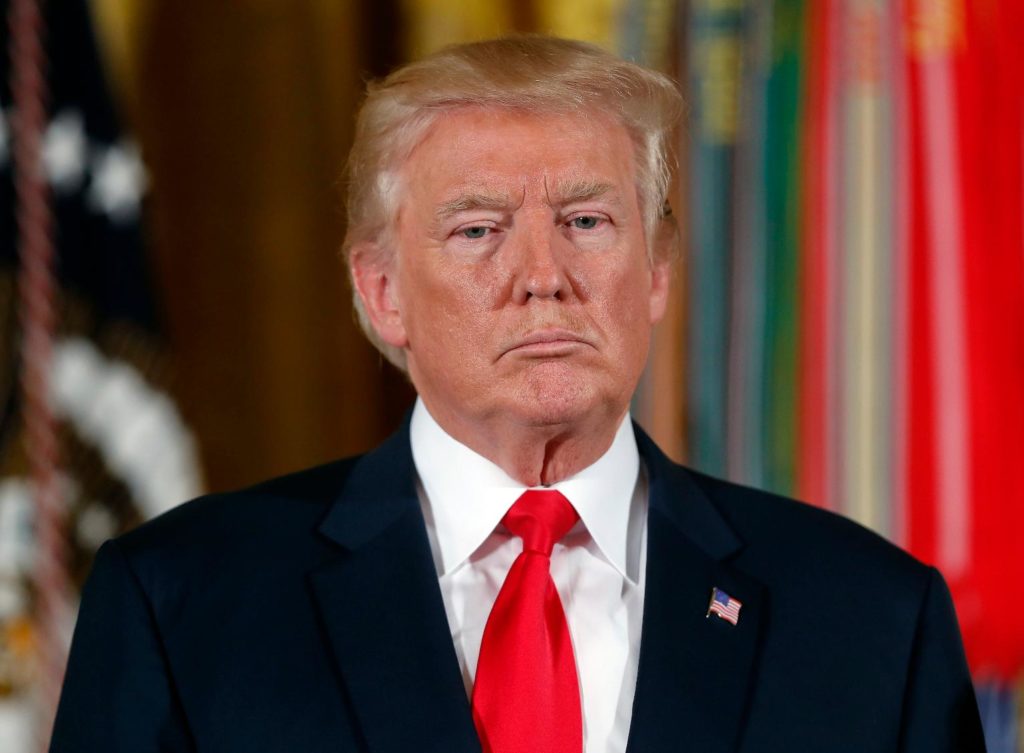
Under relentless pressure, President Donald Trump on Monday named and condemned “repugnant” hate groups and declared that “racism is evil” in a far more forceful statement than he’d made earlier after deadly, race-fueled weekend clashes in Charlottesville, Virginia. Trump’s initial failure on Saturday to denounce the groups by name – instead he bemoaned violence on “many sides” – prompted criticism from fellow Republicans as well as Democrats. This time, the president described members of the KKK, neo-Nazis and white supremacists who take part in violence as “criminals and thugs” in a prepared statement he read at the White House. “Racism is evil,” he said, singling out the hate groups as “repugnant to everything that we hold dear as Americans.” “Those who spread violence in the name of bigotry strike at the very core of America,” he said. In his remarks he also called for unity. “We must love each other, show affection for each other and unite together in condemnation of hatred, bigotry and violence. We must rediscover the bonds of love and loyalty that bring us together as Americans,” he said. Trump also, for the first time, mentioned Heather Heyer by name, as he paid tribute to the woman killed when a car plowed into a group of anti-racist counter-protesters in Charlottesville. The president left after his statement without acknowledging reporters’ shouted questions. At an event on trade later in the day, he was asked why it took two days for him to offer an explicit denunciation of the hate groups. “They have been condemned,” Trump responded before offering a fresh criticism of some media as “fake news.” Trump noted that the Justice Department has opened a civil rights investigation into the car crash that killed Heyer. “To anyone who acted criminally in this weekend’s racist violence, you will be held fully accountable. Justice will be delivered,” he said. His attorney general, Jeff Sessions, said earlier Monday that the violence “does meet the definition of domestic terrorism in our statute.” Sessions told ABC’s “Good Morning America,” ”You can be sure we will charge and advance the investigation toward the most serious charges that can be brought, because this is an unequivocally unacceptable and evil attack that cannot be accepted in America.” Trump gave his statement after meeting with Sessions and FBI Director Christopher Wray. In the hours after the incident on Saturday, Trump addressed the violence in broad strokes, saying that he condemns “in the strongest possible terms this egregious display of hatred, bigotry and violence on many sides, on many sides.” That was met with swift bipartisan criticism. Virginia Gov. Terry McAuliffe, a Democrat, said he spoke to Trump in the hours after the clashes and twice told the president “we have to stop this hateful speech, this rhetoric.” He said he urged Trump “to come out stronger” against the actions of white supremacists. Republicans joined Democrats in criticizing the president for not specifically calling out white nationalists. Sen. Cory Gardner of Colorado said Sunday on NBC, “This isn’t a time for innuendo or to allow room to be read between the lines. This is a time to lay blame.” The White House scrambled to stem the tide of criticism, dispatching aides to the Sunday talk shows and sending out a statement that more forcefully denounced the hate groups. But the White House did not attach a name to the statement. Usually, a statement would be signed by the press secretary or another staffer; not putting a name to one eliminates an individual’s responsibility and often undercuts the significance. White nationalists had assembled in Charlottesville to vent their frustration against the city’s plans to take down a statue of Confederal Gen. Robert E. Lee. Counter-protesters massed in opposition. Alt-right leader Richard Spencer and former Ku Klux Klan leader David Duke attended the demonstrations. Duke told reporters that the white nationalists were working to “fulfill the promises of Donald Trump.” Trump’s initial comments drew praise from the neo-Nazi website Daily Stormer, which wrote: “Trump comments were good. He didn’t attack us. He just said the nation should come together. Nothing specific against us. … No condemnation at all.” The website had been promoting the Charlottesville demonstration as part of its “Summer of Hate” edition. Trump, as a presidential candidate, frequently came under scrutiny for being slow to offer his condemnation of white supremacists. His strongest denunciations of the movement have not come voluntarily, only when asked, and he occasionally has trafficked in retweets of racist social media posts during his campaign. His chief strategist, Steve Bannon, once declared that his former news site, Breitbart, was “the platform for the alt-right.” Early Monday, the CEO of the nation’s third largest pharmaceutical company said he was resigning from the President’s American Manufacturing Council, citing “a responsibility to take a stand against intolerance and extremism.” Trump lashed back almost immediately at Merck CEO Kenneth Frazier on Twitter, saying Frazier “will have more time to LOWER RIPOFF DRUG PRICES!” Republished with permission of The Associated Press.
Protesters wearing KKK outfits disrupt hearing for Jeff Sessions
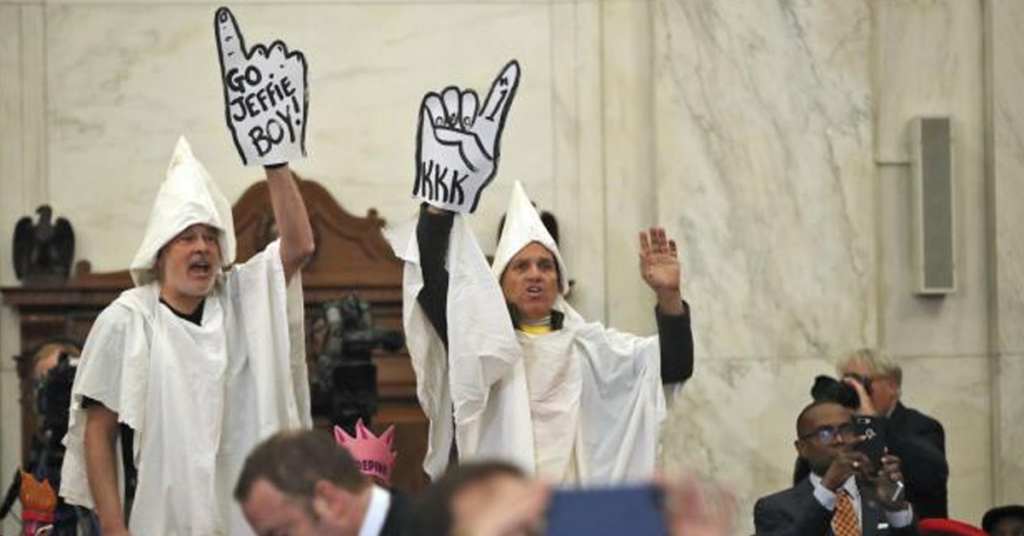
Minutes before Sen. Jeff Sessions‘ confirmation hearing began Tuesday morning, protests took the attention of the Senate Judiciary Committee. Two demonstrators dressed as Ku Klux Klan (KKK) members erupted with shouts of “white power” against Donald Trump‘s pick for attorney general. “You can’t arrest me! I’m white!” one of the protesters said as Capitol Police removed both men from the hearing room. As Sessions walked in… pic.twitter.com/4cmgzRL2q2 — Lisa Desjardins (@LisaDNews) January 10, 2017 HAPPENING NOW: Protestor thrown out of Sessions confirmation hearing. Dressed as klansman. pic.twitter.com/2DPJhg7M8M — Sam Sweeney (@SweeneyABC) January 10, 2017 Sessions gave no visible reaction to the outbursts, and proceeded to enter the room acknowledging friends and colleagues. The protests come, as the conservative Alabama senator faces concerns over how committed he would be to civil rights. “I deeply understand the history of civil rights and the horrendous impact that relentless and systemic discrimination and the denial of voting rights has had on our African-American brothers and sisters,’’ Sessions told the Senate Judiciary Committee once the hearing began. “I have witnessed it … While humans must recognize the the limits of their abilities — and I do — I am ready for this job. We will do it right.”
Donald Trump camp calls KKK newspaper ‘repulsive’ after praise

Donald Trump‘s campaign is firmly rejecting the embrace of a Ku Klux Klan-affiliated newspaper. The latest issue of The Crusader used Trump’s “Make America Great Again” campaign slogan as its headline for an editorial praising the catchphrase and the Republican presidential candidate. The newspaper bills itself as “The Premier Voice of the White Resistance.” The newspaper didn’t specifically call for readers to vote for Trump. In a statement, the Trump campaign calls the newspaper “repulsive.” It said its “views do not represent the tens of millions of Americans who are uniting behind our campaign.” Trump had been criticized earlier in the campaign for failing to immediately denounce the endorsement of David Duke, a former Grand Wizard of the Ku Klux Klan. Republished with permission of the Associated Press.
KKK member, 1963 Birmingham church bomber denied parole
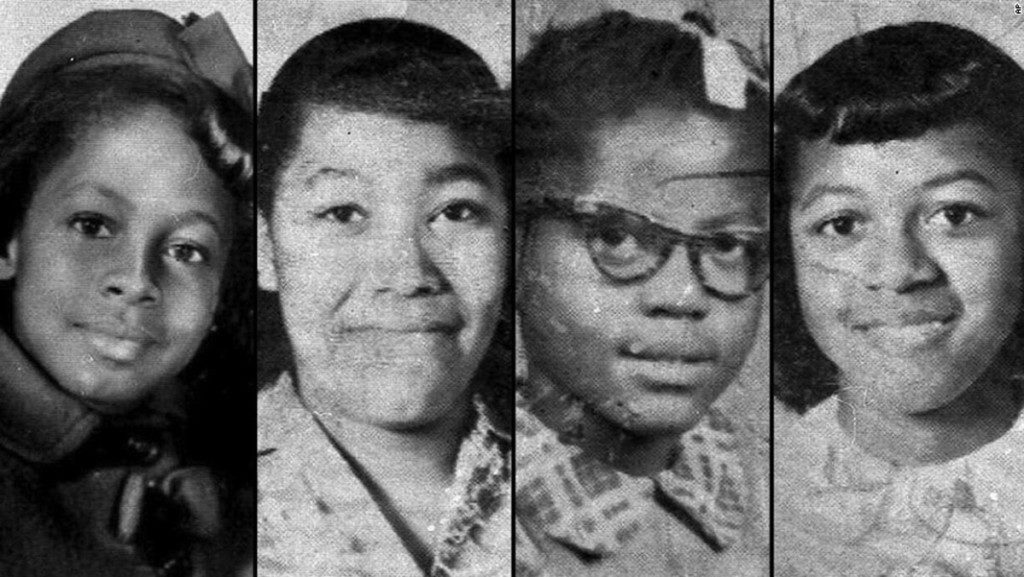
The Alabama Board of Pardons and Paroles has denied parole to an 86-year-old Ku Klux Klansman convicted of killing four African-American girls more than 50 years ago. The decision to keep Thomas Edwin Blanton Jr, imprisoned was met with applause at the hearing in a Montgomery courthouse Wednesday morning. Blanton is the last surviving KKK member convicted in 2001 for the 1963 Ku Klux Klan bombing of the 16th Street Baptist Church that killed the girls, who were at Sunday services — Addie Mae Collins, Denise McNair, Carole Robertson and Cynthia Wesley — and that injured a fifth girl, Sarah Collins, the sister of Addie Mae Collins. Almost 30 years after the bombing, Blanton was sentenced to life imprisonment for planting a bomb outside the church during the height of the civil rights movement. His two accomplices, Robert Chambliss and Bobby Frank Cherry, were also convicted of murder and have since died behind bars. Across the country, civil rights activists opposed the parole, saying Blanton has served only 15 years of four life sentences. Attorney General Luther Strange was among those in Alabama who joined in the disapproval of the potential parole of Blanton. In a July 29 letter to the parole board, AG Strange stated, “Thomas Blanton was convicted of one of the most heinous crimes in Alabama history — the murder of four young girls who were attending Sunday school. The cold-blooded callousness of his hate crime is not diminished by the passage of time, nor is any punishment sufficient to expunge the evil he unleashed. Because he has never shown any remorse whatsoever for taking the lives of those innocent little girls, justice can only be served if Thomas Blanton spends the rest of his life in prison.” Wednesday’s justice is perhaps only temporary. Blanton can be considered for parole again in five years.
Ku Klux Klan dreams of rising again 150 years after founding

Born in the ashes of the smoldering South after the Civil War, the Ku Klux Klan died and was reborn before losing the fight against civil rights in the 1960s. Membership dwindled, a unified group fractured, and one-time members went to prison for a string of murderous attacks against blacks. Many assumed the group was dead, a white-robed ghost of hate and violence. Yet today, the KKK is still alive and dreams of restoring itself to what it once was: an invisible empire spreading its tentacles throughout society. As it marks 150 years of existence, the Klan is trying to reshape itself for a new era. Klan members still gather by the dozens under starry Southern skies to set fire to crosses in the dead of night, and KKK leaflets have shown up in suburban neighborhoods from the Deep South to the Northeast in recent months. Perhaps most unwelcome to opponents, some independent Klan organizations say they are merging with larger groups to build strength. “We will work on a unified Klan and/or alliance this summer,” said Brent Waller, imperial wizard of the United Dixie White Knights in Mississippi. In a series of interviews with The Associated Press, Klan leaders said they feel that U.S. politics are going their way, as a nationalist, us-against-them mentality deepens across the nation. Stopping or limiting immigration — a desire of the Klan dating back to the 1920s — is more of a cause than ever. And leaders say membership has gone up at the twilight of President Barack Obama‘s second term in office, though few would provide numbers. Joining the Klan is as easy as filling out an online form — provided you’re white and Christian. Members can visit an online store to buy one of the Klan’s trademark white cotton robes for $145, though many splurge on the $165 satin version. While the Klan has terrorized minorities during much of the last century, its leaders now present a public front that is more virulent than violent. Leaders from several different Klan groups all said they have rules against violence aside from self-defense, and even opponents agree the KKK has toned itself down after a string of members went to prison years after the fact for deadly arson attacks, beatings, bombings and shootings. “While today’s Klan has still been involved in atrocities, there is no way it is as violent as the Klan of the ’60s,” said Mark Potok of the Southern Poverty Law Center, an advocacy group that tracks activity by groups it considers extremist. “That does not mean it is some benign group that does not engage in political violence,” he added. Historian David Cunningham, author of “Klansville, U.S.A.: The Rise and Fall of the Civil Rights-Era Ku Klux Klan,” notes that while the Klan generally doesn’t openly advocate violence, “I do think we have the sort of ‘other’ model of violence, which is creating a culture that supports the commission of violence in the name of these ideas.” Klan leaders told the AP that most of today’s groups remain small and operate independently, kept apart by disagreements over such issues as whether to associate with neo-Nazis, hold public rallies or wear the KKK’s trademark robes in colors other than white. So-called “traditional” Klan groups avoid public displays and practice rituals dating back a century; others post web videos dedicated to preaching against racial diversity and warning of a coming “white genocide.” Women are voting members in some groups, but not in others. Some leaders will not speak openly with the media but others do, articulating ambitious plans that include quietly building political strength. Some groups hold annual conventions, just like civic clubs. Members gather in meeting rooms to discuss strategies that include electing Klan members to local political offices and recruiting new blood through the internet. It’s impossible to say how many members the Klan counts today since groups don’t reveal that information, but leaders claim adherents in the thousands among scores of local groups called Klaverns. Waller said his group is growing, as did Chris Barker, imperial wizard of the Loyal White Knights of the Ku Klux Klan in Eden, North Carolina. “Most Klan groups I talk to could hold a meeting in the bathroom in McDonald’s,” Barker said. As for his Klavern, he said, “Right now, I’m close to 3,800 members in my group alone.” The Anti-Defamation League, the Jewish protection group that monitors Klan activity, describes Barker’s Loyal White Knights as the most active Klan group today, but estimates it has no more than 200 members total. The ADL puts total Klan membership nationwide at around 3,000. The Alabama-based SPLC says there’s no evidence the Klan is returning to the strength of its heyday. It estimates the Klan has about 190 chapters nationally with no more than 6,000 members total, which would be a mere shadow of its estimated 2 million to 5 million members in the 1920s. “The idea of unifying the Klan like it was in the ’20s is a persistent dream of the Klan, but it’s not happening,” Potok said. Formed just months after the end of the Civil War by six former Confederate officers in Pulaski, Tennessee, the Klan originally seemed more like a college fraternity with ceremonial robes and odd titles for its officers. But soon, freed blacks were being terrorized, and the Klan was blamed. Hundreds of people were assaulted or killed within the span of a few years as whites tried to regain control of the defeated Confederacy. Congress effectively outlawed the Klan in 1871, leading to martial law in some places and thousands of arrests, and the group died. The Klan seemed relegated to history until World War I, when it was resurrected. It grew as waves of immigrants arrived aboard ships from Europe and elsewhere, and grew more as the NAACP challenged Jim Crow laws in the South in the 1920s. Millions joined, including community leaders like bankers and lawyers. That momentum declined, and best estimates place
Man arrested for punching anti-Donald Trump protester is an Air Force member
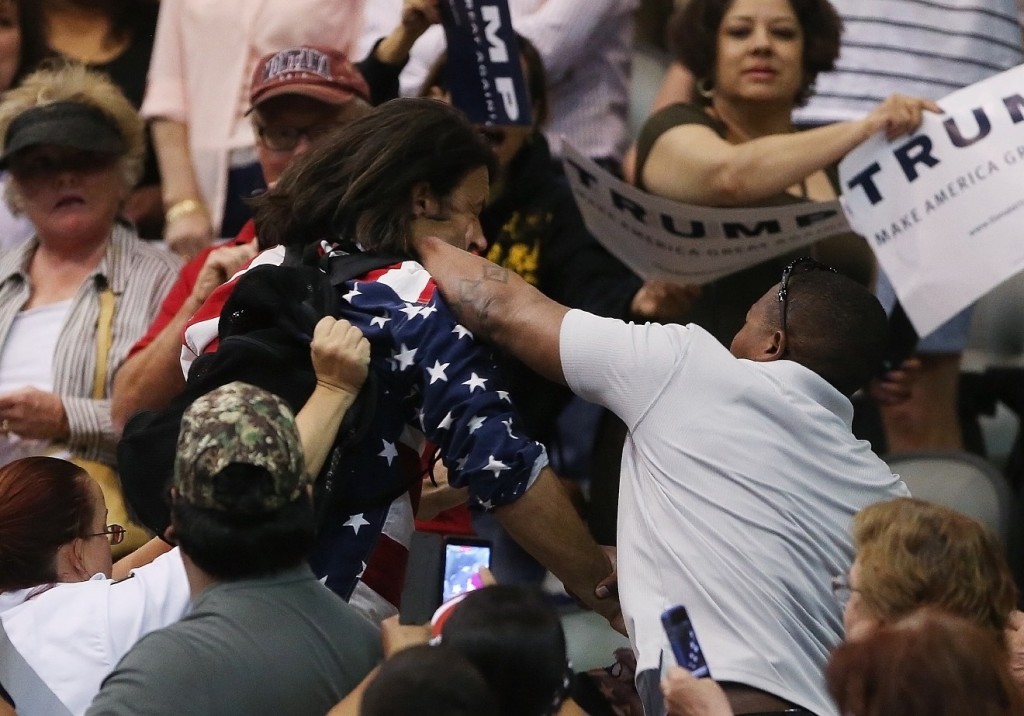
A man captured on video kicking and punching an anti-Donald Trump protester at the presidential candidate’s rally in Tucson on Saturday is a member of the Air Force. Staff Sgt. Tony Pettway, a response force leader, is assigned to the Davis-Monthan Air Force Base in Tucson and was arrested on Saturday on a misdemeanor charge of assault with injury. He works in security forces. The event in Tucson turned ugly when two protesters displayed offensive imagery in an attempt to make a statement against the divisiveness of the Trump campaign. Pettway was one of several people arrested at two Trump rallies in Arizona this weekend. The anti-Trump protester carried a sign with a Confederate flag over an image of Trump and was being escorted out of the building when Pettway punched and kicked him. The incident was caught on video. People can be heard cheering as Trump denounces another protester who was wearing a KKK-style sheet. “There’s a disgusting guy. Puts a Ku Klux Klan hat on. Thinks he’s cute. He’s a disgusting guy,” Trump said. “I’m going to tell you folks, that’s a disgrace. They are taking away our First Amendment rights.” Davis-Monthan is reviewing the situation and will take appropriate action, said 2nd Lt. Sydney Smith of the 355th Fighter Wing public affairs office. Airmen are allowed to participate in political events on their own time, Smith said. “We believe wholeheartedly in our fellow Americans’ rights to express their views on political issues, and we strongly condemn any attempt to silence those views through force or violence,” Smith said. Pettway was released without being booked into jail. It is unclear if he has an attorney. Pettway, 32, began active duty in the Air Force in August 2002 and completed his basic training at Lackland Air Force Base in Texas, Air Force Personnel Center spokesman Mike Dickerson said. He was stationed in South Korea twice and in New Mexico before moving to Davis-Monthan in December 2012. Dickerson said Pettway has received a commendation medal on three occasions but didn’t know what they were for. Tucson police also arrested 67-year-old Linda Rothman on a misdemeanor count of assault without injury. They haven’t said why she was arrested. Authorities in Phoenix, where Trump held a rally earlier in the day, also arrested several protesters. Maricopa County Sheriff’s deputies identified three protesters who were arrested while helping block the only major highway leading to a Trump rally in metropolitan Phoenix. Steffany Laughlin, Jacinta Gonzalez and Michael Cassidy were all booked on one count of obstructing a public thoroughfare, deputies said. Republished with permission of the Associated Press.
KKK distributes fliers in Mobile featuring Martin Luther King Jr.

During the weekend the Loyal White Knights of the Ku Klux Klan, based in Pelham, North Carolina, distributed fliers throughout Mobile, Alabama, referencing Dr. Martin Luther King Jr. The fliers were found by residents, and promptly discarded, only one day before the country celebrated King’s legacy Monday. The fliers, like ones previously distributed across the state, were in plastic bags and found on lawns throughout the city’s Midtown neighborhood. In 2014, fliers were distributed throughout Tallassee and, in 2015, similar flyers were distributed in Selma on the 50th anniversary of Bloody Sunday. According to multiple reports, the fliers contained a “happy birthday” message to King and further said “The blacks have NAACP, the Mexicans have La Raza, the Jews have JDL, and white people have the KKK.” Though a phone call to the group was unsuccessful, the voice mailbox opened with: “Hey whitey, how do you feel about this Martin Luther King Day?” The message went on to disparage King in a variety of ways, using expletives and insulting racist language. It also urged the day be used to celebrate the legacy of Gen. Robert E. Lee. The group’s website calls itself an organization for “White Christian Men & Women Working to Secure A Future, For Pure White Americans” and rejects assertions it’s a hate group. If any of the fliers’ distributors are found, criminal littering charges could be levied, police said.
Alabama KKK actively recruiting to ‘fight the spread of Islam’

Following the terrorist attacks in Paris and San Bernardino, California, residents in Alabama neighborhoods of Cullman and Decatur have reportedly found themselves being recruited by the Ku Klux Klan (KKK) “to fight the spread of Islam in our country.” While the circumstances surrounding the distribution of the alleged KKK recruiting flyers have reportedly are not known, the Alabama chapter of the Council on American-Islamic Relations — America’s largest Muslim civil liberties and advocacy organization — has called on statewide officials to reject growing anti-Islam sentiments, according to a news release. According to the release, similar flyers were reportedly distributed in the same area back in September but without any reference to Islam. “Our state’s leaders must speak out against the rising anti-Muslim bigotry nationwide that is apparently inspiring a new recruiting effort by racists,” said CAIR-Alabama Executive Director Khaula Hadeed. “The KKK must be repudiated, whether it targets African-Americans, Muslims or any other minority group with hatred and intimidation.” The recent flier distribution suggest the KKK’s presence in Alabama is growing, as some 4,000 fliers were left at people’s homes in March as civil rights activists descended on Selma for the 50th anniversary of “Bloody Sunday” in both Selma and Montgomery, historically African American cities. The week that followed, several African American residents in Auburn notified police back in March recruitment fliers attached to rocks were thrown on their driveways. Similar incidents are on the rise nationwide as anti-Muslim sentiment is growing in the wake of the recent terrorist attacks. Joining in the anti-Islamic rhetoric and adding fuel to the fire, Republican presidential candidate Donald Trump stirred global outrage by calling for a “total and complete” ban on Muslims entering the country Monday night. “We have no choice,” Trump said to a standing ovation at a rally in South Carolina, calling the ban “common sense.” Trump continued in a statement, “Without looking at the various polling data, it is obvious to anybody the hatred is beyond comprehension. Where this hatred comes from and why we will have to determine. Until we are able to determine and understand this problem and the dangerous threat it poses, our country cannot be the victims of horrendous attacks by people that believe only in Jihad and have no sense of reason or respect for human life.” Trump’s comments stoked widespread public outrage. “This is exactly what ISIS wants, to turn Americans against one another,” a CAIR representative said. “We stand today united as Americans against stigmatization, against Islamophobia, against ISIS.”


